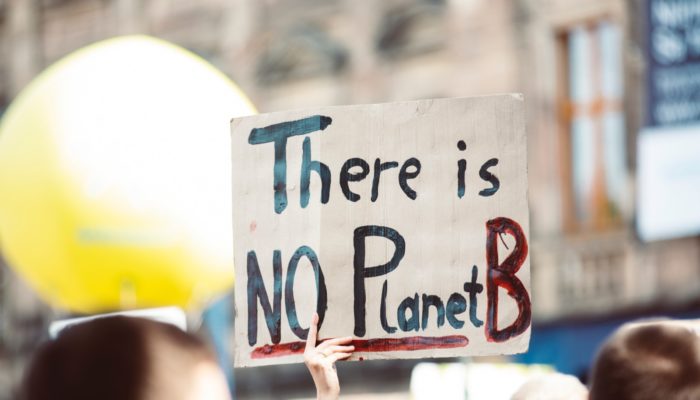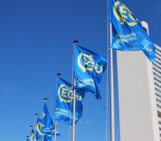
In October 2019, an open letter was published, addressing both EGU and AGU regarding their policy to reduce the carbon footprint of their annual conferences. Almost 2000 scientists already signed this letter, asking for more ambitious measures to decline carbon emissions, in line with the goals of 50% reduction by 2030 and near-zero emissions by 2050 (IPCC SR15, 2018).
Some of the proposed improvements include the facilitation of organised transport (e.g., trains or buses) from major cities in Europe, as well as offering video-conference options, so that scientists can attend sessions remotely as well. While these measures are hopefully on the EGU’s agenda, other measures have already been taken over the past few years.
Upon registration, the EGU provides the opportunity to offset the CO2 emissions from travel, by donating money to projects aimed at reducing the impact on our planet. The organisation encourages people to come by train and offers a discount for people travelling with the Swiss Federal Railways (SBB), and hopefully other railway companies this year as well. Other measures include the ban of single-use water bottles from coffee breaks, as well as serving only vegetarian sandwiches at the division meetings.
While every step matters, many scientists feel that more should be done to reduce our carbon footprint. They state that we can no longer use the content of our research to justify an exception for scientists to contribute to a global reduction in greenhouse emissions. Therefore, we need to change the way we do our jobs and make different choices. Fortunately, there are many choices one can make that will have a positive effect on our planet. Below, I share some examples of things you can do to reduce your carbon footprint at EGU’s next General Assembly.
Consider to stay home
This doesn’t sound very inviting coming from one of the EGU division blogs, but I believe we need to carefully consider whether our presence at each year’s General Assembly is actually necessary. More and more people attend the General Assembly each year, possibly creating some challenges for the Austria Centre Vienna (ACV) to host all these scientists in the future. Of course, the conference is a great way to share your work, interact with colleagues and get new research ideas, but these career benefits might not always outweigh the environmental costs of your trip.
Travel to Vienna by train
A less extreme measure, but one that makes a big difference, is the choice to travel by train, rather than taking the airplane. There are destinations in Europe from which you can travel quite easily to Vienna by train. Some examples: from Paris, you could take the TGV to Frankfurt and hop on the night train to Vienna, a total journey of about 13 hours and currently offered for about €260* both ways (SNCF). From the Netherlands, you could take the ICE train to Düsseldorf or Cologne (Germany) and then board the same night train towards Vienna (NS international, 15 hours, €300 both ways). Coming from London, there is the Eurostar that takes you to Paris in 2,5 hours (€85 both ways), from which you can continue your journey to Vienna. If you live in Italy, you could travel to Venice with Trenitalia and then take the night train to Vienna from there (10 hours, €35), or go during the day via either Venice or Bolzano (5-7 hours, €30). And finally, when travelling from Zurich with the Swiss Federal Railways (SBB), the EGU negotiated a discount for GA attendees. Of course, a journey by train will take longer than by airplane, but if you spend that time sleeping in your ‘couchette’, it won’t make a big difference, and might even save you the cost of one extra night in your hotel! On top of that, slow travel can be quite pleasant, as it is often more comfortable, allows you to admire the beautiful landscapes passing by, or gives you time to work a bit during your journey.
Reduce your waste
A small change you could implement quite easily, is bringing your own water bottle and travel mug to the conference centre. EGU no longer offers single-use water bottles at coffee breaks, but water fountains can be found all over the building where you can refill your own bottle. Paper cups are still offered at the coffee breaks during the General Assembly, so imagine how much paper you could save if you use your own travel mug instead of a new paper cup during each single coffee break. And using your own mug might inspire other attendees to do the same next time!
Eat more plants
Another aspect of reducing your carbon footprint is by limiting your consumption of meat. The meat and dairy industry have been shown to be among the biggest contributors to the emission of greenhouse gases, as well as to other processes like water- and air pollution. Of course, Vienna is known for the Wiener Schnitzel, but there are plenty of options to eat vegetarian or vegan as well. If you want to check out some all vegan places, try Swing Kitchen for a tasty burger with fries, go to Simply Raw Bakery for a delicious vegan breakfast, or treat yourself to one of the wholesome plant-based meals of Venuss Bistro. For both vegetarian and vegan options, go to the daily buffet at Yamm! restaurant, where dishes from many different parts of the world are served. For more inspiration, visit the website Happy Cow and find veggie-friendly restaurants in cities all over the world. Of course, no one expects you to go cold turkey and stop eating meat at once; that is simply very hard. However, every step matters and replacing your Wiener Schnitzel with a plant-based meal just once during your stay in Vienna will already make a difference.
Combine your trip with other meetings
Conferences are a great opportunity to network and catch up with your colleagues from other labs. Rather than making separate trips to meet some of your colleagues, why not try to plan meetings with them in Vienna, either during, before or after the General Assembly? Another option is to visit multiple destinations in one trip, for example by visiting your colleagues in Paris when you’re on your way back to London. This could also serve as a welcome break during the long train journey home from Vienna, so it’s a win-win!
Worried that these actions will only scratch the surface? Imagine 16,000 scientists making these choices each year; we will definitely make a difference!
*Prices and travel times based on a search in February 2020



